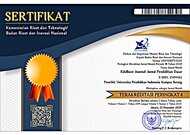The Relationship Between Breakfast Habits and Playing Activities for Children Aged 5-6 Years in Al-Kautsar Integrated Islamic Kindergarten
Abstract
Breakfast is essential since it affects children's playing activities at school. This study, therefore, aimed to determine the relationship between breakfast habits and children's playing activities aged 5-6 years at Al-Kautsar Integrated Islamic Kindergarten, Lubuk Begalung, Padang. The research approach used was quantitative with this type of correlational research. The sample studied was 41 children. Data collection techniques employed observation and questionnaires. The instrument utilized was an observation sheet of children's breakfast habits filled in by the child's parents, while the teacher filled in a questionnaire about playing activities. The instrument was tested for validity and reliability. Testing the instrument validity used the Product Moment formula, whereas the reliability test used was the Alpha formula. The data analysis technique used was a product-moment correlation for hypothesis testing. The results of testing the hypothesis in this study obtained an R-count of 0.527. This result was more significant than the r-table at a significance level of 5%, gained 0.316. This study found a positive relationship between breakfast habits and playing activities of children aged 5-6 years at Al-Kautsar Integrated Islamic Kindergarten, Lubuk Begalung, Padang. The effective contribution of breakfast habits to playing activities in children aged 5-6 years at Al-Kautsar Islamic Integrated Kindergarten, Lubuk Begalung, Padang, was r2 x 100%, i.e., 27.75%. This result could be a reference for parents and teachers to be more concerned about breakfast habits for children's development.
Keywords
Full Text:
PDFReferences
Ermona, N. D. N., & Wirjatmadi, B. (2018). Hubungan aktivitas fisik dan asupan gizi dengan status gizi lebih pada anak usia sekolah dasar di SDN Ketabang 1 Kota Surabaya Tahun 2017. Amerta Nutrition, 2(1), 97–105.
Folta, S. C., Djang, H. C., Halmo, M., Metayer, N., Blondin, S. A., Smith, K. S., Economos, C. D. (2016). School staff, parent and student perceptions of a breakfast in the classroom model during initial implementation. Public Health Nutrition, 19(9), 1696–1706.
Gündoğan, A. (2020). Play activities in kindergarten: Their effects on school liking and relationships with teachers International Journal of Early Childhood Education Studies, 4(2), 15–32.
Hapsari, W. D., & Martini, S. (2022). The effect of breakfast habits on the learning achievement of children in public elementary school 2 Tanggungharjo. Jurnal Profesi Bidan Indonesia, 2(1), 23–27.
Harahap, H., Widodo, Y., Sandjaja, S., Khouw, I., & Deurenberg, P. (2019). Quantity and quality of breakfast of children aged 2.0 to 12.9 years in Indonesia. Gizi Indonesia, 42(1), 31–42.
Hasanah, U. (2018). Strategi pembelajaran aktif untuk anak usia dini. Insania: Jurnal Pemikiran Alternatif Kependidikan, 23(2), 204–222.
Helgadóttir, B, Baurén, H, Kjellenberg, K, Ekblom, Ö, & Nyberg, G. (2021). Breakfast habits and associations with fruit and vegetable intake, physical activity, sedentary time, and screen time among Swedish 13–14–year–old girls and boys. Nutrients, 13(12), 4467.
Hoata, A. T., Sutadarma, I. W. G., & Dewi, N. N. A. (2021). Hubungan kebiasaan sarapan pagi dan status gizi terhadap prestasi belajar siswa sekolah dasar. E-Jurnal Medika Udayana, 10(1), 53–59.
Kawalec, A., & Pawlas, K. (2021). Breakfast frequency and composition in a group of Polish children aged 7–10 years. Nutrients, 13(7), 2241.
Khalifah, D. N., Asna, A. F., & Sari, A. E. (2019). Breakfast habits, physical activities, and overweight in elementary school children. Indonesian Journal of Nutrition and Dietetics, 7(1), 9–15.
Kostecka, M. (2022). The Effect of the "colorful eating is healthy eating" long-term nutrition education program for 3- to 6-year-olds on eating habits in the family and parental nutrition knowledge. International Journal Environmental Research and Public Health, 19(4), 1981.
Lani, A., Margawati, A., & Fitranti, D. Y. (2017). Hubungan frekuensi sarapan dan konsumsi jajan dengan z-score IMT/U pada siswa sekolah dasar. Journal of Nutrition College, 6(4), 277–284.
Lasidi, O. D., Umboh, A., & Ismanto, Y. (2018). Hubungan status gizi dan kualitas sarapan pagi dengan prestasi belajar siswa kelas IV dan V di SD Negeri 21 Manado. Jurnal Keperawatan, 6(1), 1–7.
Lehto, S., & Eskelinen, K. (2020). ‘Playing makes it fun’ in out-of-school activities: Children’s organised leisure. Childhood, 27(4), 545–561.
López-Gil, J. F., Smith, L., López-Bueno, R., & Tárraga-López, P. J. (2022). Breakfast and psychosocial behavioural problems in young population: The role of status, place, and habits. Frontiers in Nutrition, 9, 871238.
Lynch, C., Kristjansdottir, A. G., Te Velde, S. J.,… & Yngve, A. (2014). Fruit and vegetable consumption in a sample of 11-year-old children in ten European countries--the PRO GREENS cross-sectional survey. Public Health Nutrition, 17(11), 2436–2444.
Parker, R., Thomsen, B. S., & Berry, A. (2022). Learning through play at school – A framework for policy and practice. Frontiers in Education, 7, 751801.
Pratiwi, W. (2017). Konsep bermain pada anak usia dini. TADBIR: Jurnal Manajemen Pendidikan Islam, 5(2), 106–117.
Ramadhani, T. F., & Fourianalistyawati, E. (2015). Hubungan antara sikap terhadap kebiasaan sarapan pagi dengan tingkat berat badan pada siswa SD "X". Psibernetika, 8(1), 1–18.
Ward, S. A., Bélanger, M. F., Donovan, D., & Carrier, N. (2016). Relationship between eating behaviors and physical activity of preschoolers and their peers: A systematic review. International Journal of Behavioral Nutrition and Physical Activity, 13, 50.
Wiresti, R. D., & Na’imah, N. (2020). Aspek perkembangan anak: Urgensitas ditinjau dalam paradigma psikologi perkembangan anak. Aulad: Journal on Early Childhood, 3(1), 36–44.
Zakrzewski-Fruer, J. K., Gillison, F. B., Katzmarzyk, P. T.,… & Standage, M. (2019). Association between breakfast frequency and physical activity and sedentary time: a cross-sectional study in children from 12 countries. BMC Public Health, 19, 222.
Zulaekah, S. (2012). Pendidikan gizi dengan media booklet terhadap pengetahuan gizi. Kemas: Jurnal Kesehatan Masyarakat, 7(2), 127–133.
DOI: https://doi.org/10.17509/ebj.v5i2.46271
Refbacks
- There are currently no refbacks.
Copyright (c) 2023 Universitas Pendidikan Indonesia
This work is licensed under a Creative Commons Attribution 4.0 International License.
This journal is indexed by




.png)




.png)
1.png)


1.png)

.png)